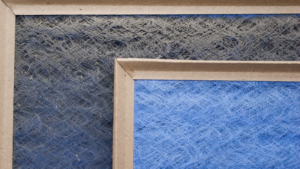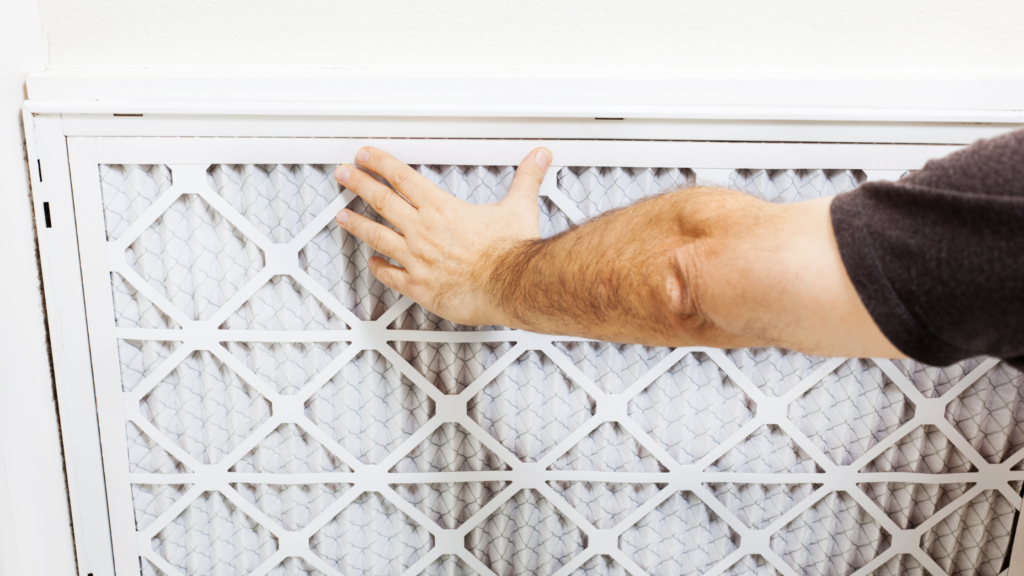If you have an air conditioner and you’re changing your filters regularly as you should be for best results, you’ve probably been standing in a hardware store, staring at a wall of HVAC (heating, ventilation, and air conditioning) filters, not knowing why there or so many options, or why some cost around $5 while some that look similar cost $25.
Don’t worry! This article will help you figure out which filter is right for your particular needs!
Getting the right measurements
First to narrow it down and so you don’t leave the store empty-handed, you definitely need to go into the store knowing what size air filter you need for your system. If you have a filter that fits in there at the moment, it will say in large print a number like ‘24”x24”x1”’. You can easily write this down or take a photo on your phone to whip out once you’re looking at the filters. If you don’t have an existing filter in there, you can measure for it yourself. Make sure your HVAC is turned off when you do this.
If you have an unusually sized filter area, some companies online are making customized filters for those unique systems.
So, that was the easy part. Now you know the size you need, but there are still options upon options.
Are the pricey ones really better?
Let’s look at the purpose of the air filter. It is there to catch particulates such as dust, pollen, pet dander, dead skin, smoke, and other contaminants before they enter your HVAC system. This results in a cleaner and longer running HVAC system that needs fewer repairs and the quality of the air in your home is much better. If dirt and dust get into your system, they will begin to block off the air flow, and your HVAC system will need to run longer just to bring the house to the set temperature. So different homes will need filters of varying materials depending on their needs.
Meet MERV
HVAC filters for your home all have a rating called a MERV rating, which is from 1 to 13. A rating of 13 to 20 is for a HEPA filter or used in hospitals and other health-related settings.
What does the rating mean?
The MERV (Minimum Efficiency Reporting Value) rating is a standard created by the American Society of Heating, Refrigerating and Air-Conditioning Engineers (ASHRAE) to evaluate the effectiveness of air filters.
Different filter materials have different MERV ratings because they have varying abilities to protect from particulates. So basically, the higher the rating, the fewer particulates can get through. But you don’t necessarily want a filter that blocks out everything. Read on…
Note that MERV ratings do vary so this is just a guide!
MERV 0-3
Spun fiberglass is usually the minimum cost and protection. This type works to protect your HVAC system from particulates but isn’t very effective at improving the quality of your air. If you or your family are experiencing respiratory problems, it could be improved just by changing to a filter with a higher MERV rating.
MERV 4-11
Pleated paper or pleated polyester filters offer improved filtration. Choose one with more pleats – that means a thicker filter for particulates to get through, but also more surface area for air to get through. That makes it less difficult on your system.
MERV 8-13
Electrostatic self-charging cotton or paper fiber filters are an interesting way to collect particulates. Their electrostatic works like a magnet to grab dust and dirt. Some of these are washable, some aren’t.
Which brings us to washable filters. Some of the more expensive filters you see on the shelf will be the washable variety. These last for several years and are usually framed in aluminum as opposed to cardboard like disposable filters. While there is a higher initial cost on the washable filter, you will save money in the long run as they last for years, rather than a couple of months. If you choose to invest in a washable filter, know that you need to be committed to cleaning it and letting it fully dry rather than just changing it out when the time comes. It’s not very difficult, but some people prefer convenience. Washable filters are able to be cleaned more frequently should you prefer to keep your filter pristine, and you’re also not throwing filters into the landfill every time.
MERV 13+
HEPA – You’ve probably heard of a HEPA filter, but did you know that it stands for High-Efficiency Particulate Arrestance? That basically means “really, really good at stopping stuff from getting through”. This type of filter works well with high energy, high powered system like a hospital’s. But most likely your HVAC system in your home will not be strong enough to be able to pull air through the incredibly thick, restricted airflow area of a HEPA filter. If you do need (some people need this due to health reasons) HEPA-level filtration in your home without straining your HVAC system, you might want to consider adding a separate HEPA filtration device.

So there you have it, all of the filter types. Hopefully, this helps you see that you don’t necessarily need the most expensive filter out there. And you know that if you do choose a higher rating, what you’re getting and why.
Most homeowners will want to choose a filter with a MERV rating somewhere in the middle between 4-11 – high enough to prevent a good number of particulates from entering not only your system but also your home once passing through the system, and low enough that it doesn’t strain your HVAC system, causing it to overwork, possibly overheat, and raise your energy bills. If you live in an area that is particularly dusty, have a lot of pets or pets with certain types of hair, or have allergies, these are all reasons to look for a higher MERV rating.
If you’re dealing with mold in your home, it’s important to have a professional implement a plan to eradicate it as it can be dangerous, but a higher MERV rated filter can help to improve your health and air quality while you address it.
If you’re looking for installation, repair, and maintenance services for all types of HVAC systems, contact Rocket Cooling. We offer comprehensive maintenance plans to ensure your HVAC system is always running at its best.
